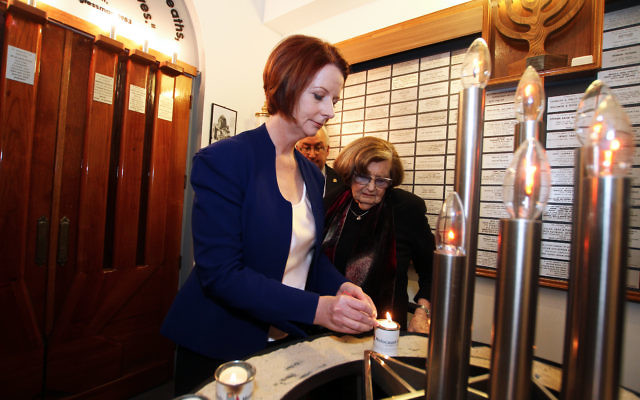PM’s Shoah pledge
BEYOND the news of a $500,000 grant that will bring Australia into a small circle of nations contributing to the memorialisation of Auschwitz-Birkenau, Prime Minister Julia Gillard’s visit to the Jewish Holocaust Centre in Melbourne to personally announce the contribution resonated a deep sense of solidarity. July 26 at the Holocaust centre was remarkable. It is not every day that Jewish Australians, many of them Shoah survivors, sing the Partisans March in Yiddish in the company of the Prime Minister.
BEYOND the news of a $500,000 grant that will bring Australia into a small circle of nations contributing to the memorialisation of Auschwitz-Birkenau, Prime Minister Julia Gillard’s visit to the Jewish Holocaust Centre in Melbourne to personally announce the contribution resonated a deep sense of solidarity.
July 26 at the Holocaust centre was remarkable. It is not every day that Jewish Australians, many of them Shoah survivors, sing the Partisans March in Yiddish in the company of the Prime Minister.
Gillard stepped down from the podium, and stood, flanked by survivors, centre volunteers, political, civic and Jewish community leaders, and diplomatic representatives of Poland, Bosnia, the US, France, the United Kingdom, Botswana and South Sudan, following the words on a large screen. Australia is perhaps among a handful of countries where such a scene could be played out.
Melbourne Ports MP Michael Danby and Isaacs MP Mark Dreyfus – both of whom lost family in the Shoah – had strongly advocated for Australia to become a contributor to the Auschwitz Foundation Project, and in an emotive speech to a capacity audience of more than 300, Gillard acknowledged the two MPs’ roles. “With the support and advocacy of Mark Dreyfus and Michael Danby, I’m proud to say Australia has joined the community of nations by contributing half-a-million dollars to the foundation’s perpetual fund. The intention of the fund is simple: to ensure that the foundation will never want for money so that Auschwitz-Birkenau will always be conserved,” the PM said.
The Auschwitz-Birkenau Found-ation Perpetual Fund was set up in 2009 to conserve the former death camps as memorial sites for future generations, a task historically carried out by the Polish government.
Gillard heard the impressions of Tobi Rosengarten, a year 10 Caulfield Grammar student, who works as a volunteer at the Holocaust centre under her school’s community service program; Anna Berlin, a history teacher at Melbourne High School, who teaches Holocaust studies, and survivor Willy Lermer, who recounted in chilling detail the route at Auschwitz from the trains to the gas chambers.
The PM responded: “We are here to be the voice of those whose voice was stilled by the greatest crime humanity has ever known: the Shoah, the Holocaust … A part of us must always be on guard, always aware, because we know the depths to which even educated men and women – an advanced civilisation – can, and did, sink. How quickly it can happen. How irreversible the consequences. How deep the legacy of grief.”
Gillard, who took a guided tour of the Holocaust centre with curator Jayne Josem and a small group of survivors, paid tribute to two iconic Holocaust heroes – Irena Sendler, who saved some 2500 Jews, mainly children, from the Warsaw Ghetto, and Raoul Wallenberg, who saved 100,000 Jews in Hungary, and whose birth centenary will be marked this month.
“Indeed, the stories of Irena Sendler and Raoul Wallenberg pose for us the question whether each of us would have shown the same determination to act under such horrific circumstances, even though others did not. Fortunately it is a question most of us will never have to face,” the PM said.
“But there is one moral and civic response to the Holocaust that does concern us all: we must ensure the Holocaust remains as a sign and warning for all generations … Therefore we must be the witnesses for the witnesses. We must be the custodians of the records, the stories, the artefacts and the places that denial can never overcome.
“The more time passes from the Shoah, the more imperative it is to ensure that memories do not fade. That history is not rewritten. That the Holocaust and its meaning is represented to every generation. That we never fail to bear witness,” said Gillard. “So we pledge, once more, here today, joining with people of goodwill in every country to say, never again. Never, ever again.”
Australia/Israel & Jewish Affairs Council executive director Dr Colin Rubenstein, who hosted a 2010 visit by Dr Piotr Cywinski, during which the director of the Auschwitz-Birkenau Memorial and Museum made his request for Australian support, lauded the government’s decision to approve the grant. “We’re delighted the government’s been far-sighted and has provided this very important grant to maintain the memorial site.”
PETER KOHN


comments